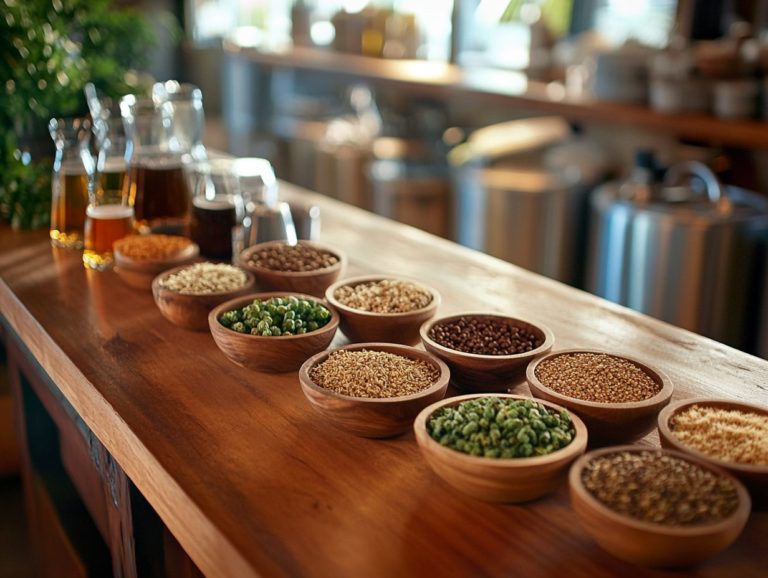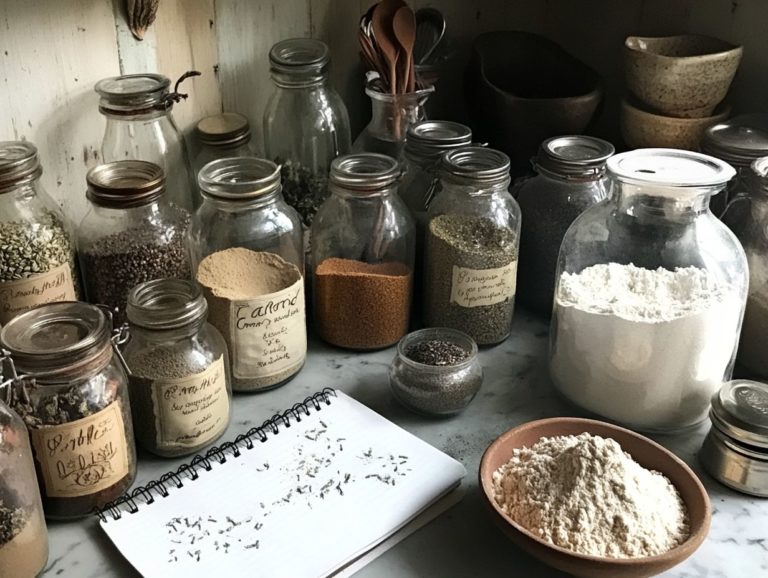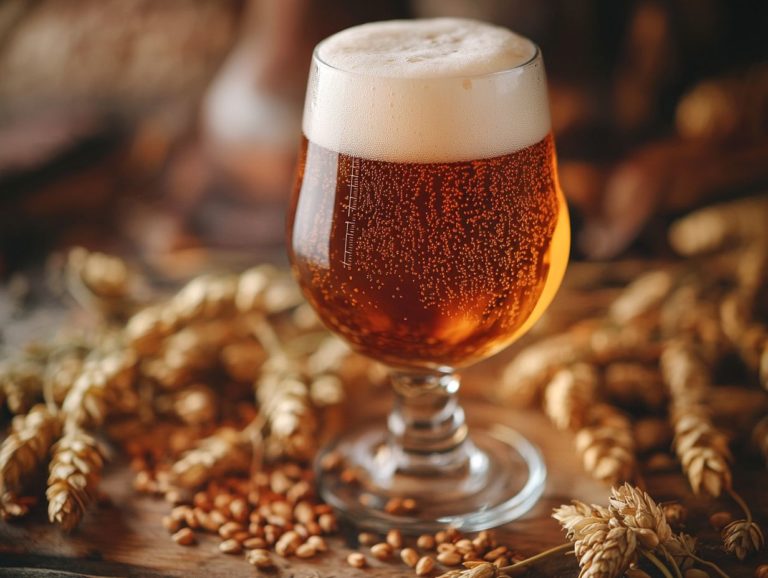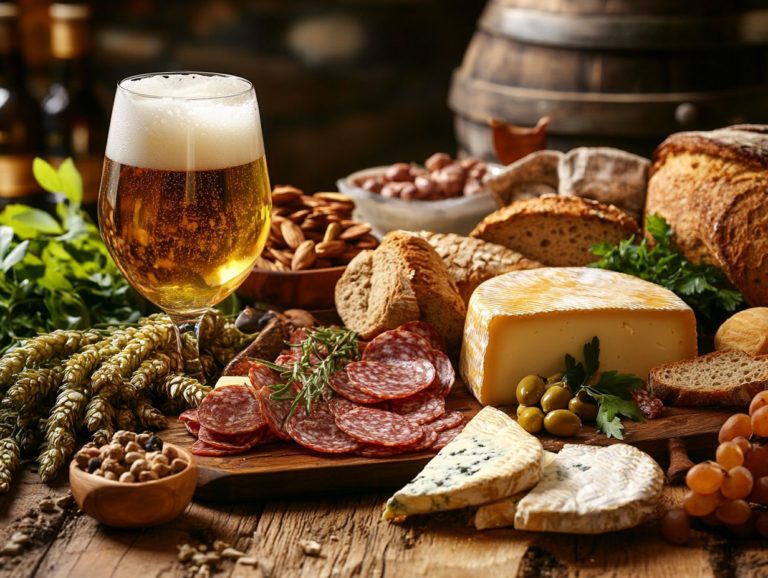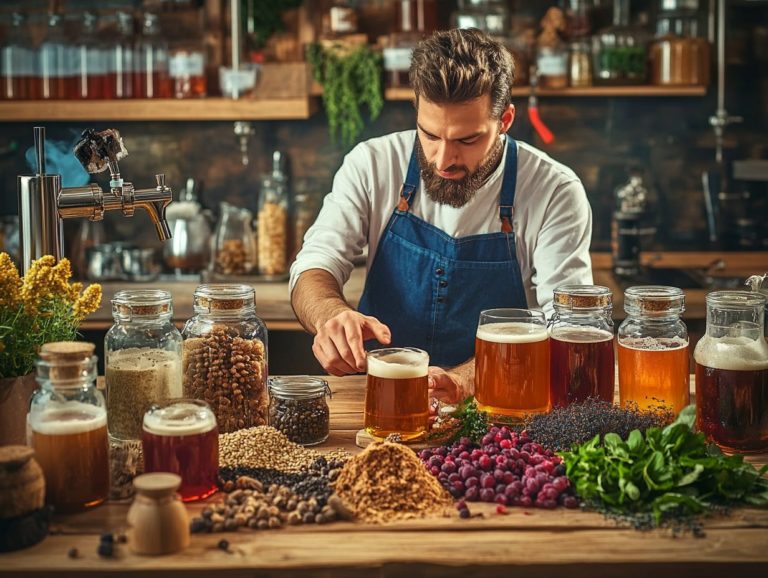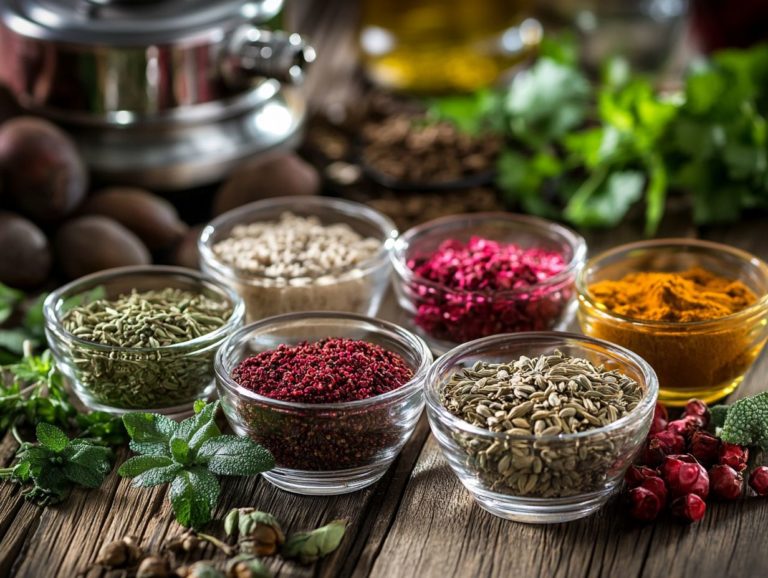The Essential Guide to Brewing Additives
Brewing additives are essential in crafting the ideal beverage, affecting everything from flavor profiles to shelf life. Whether you re into home beer making or commercial beer brewing, understanding these additives is critical.
This guide delves into what brewing additives are, the various types available, and the specific roles they play in the brewing process, including aspects like water treatment and the impact on beer clarity.
Whether you re an experienced brewer or just beginning your journey, grasping these vital ingredients can significantly enhance your brewing skills and elevate the final product.
Join us in exploring the intriguing world of brewing additives, including components like calcium carbonate, gypsum, and magnesium sulfate, and their influence on your favorite drinks.
Contents
Key Takeaways:
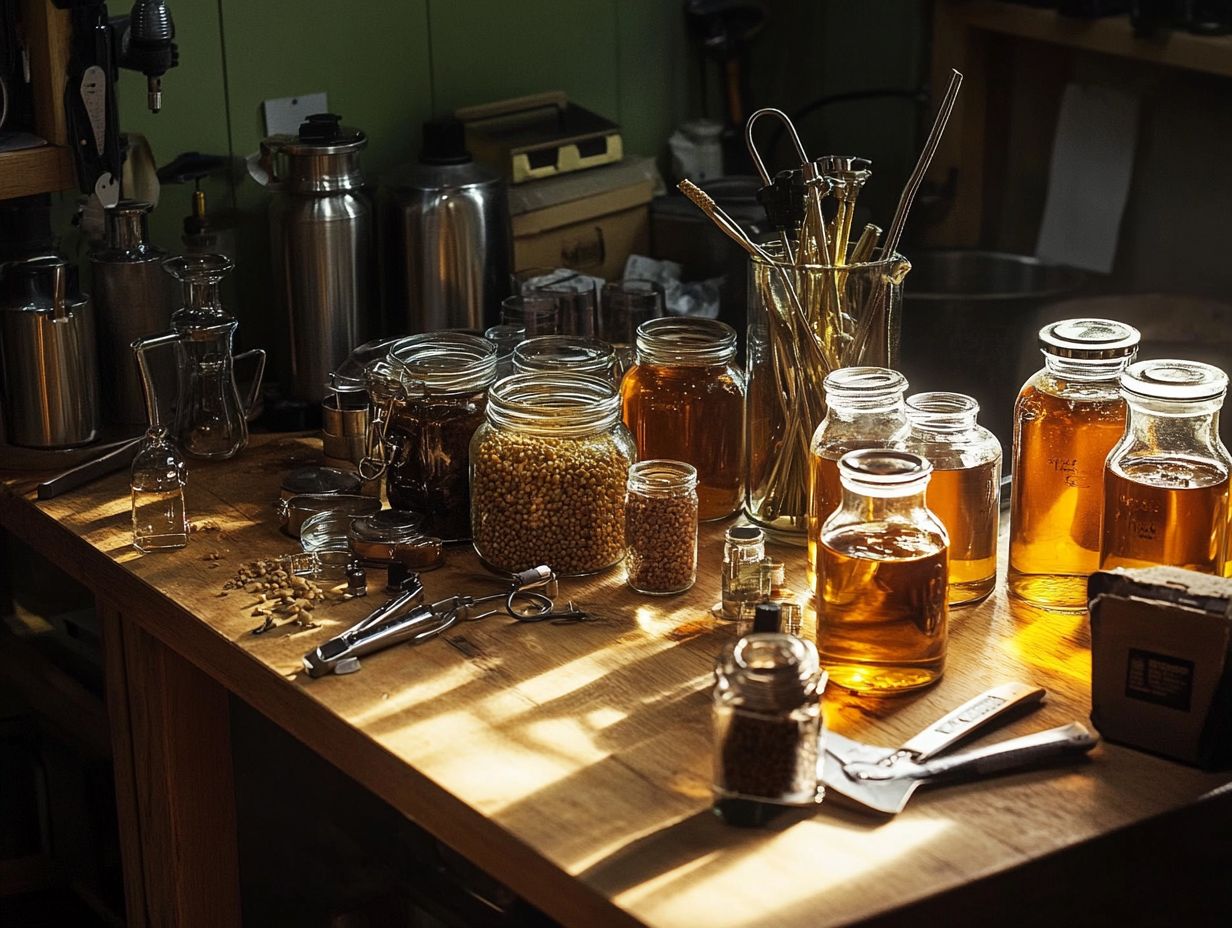
- Brewing additives are substances added during the brewing process to enhance flavor, improve appearance, extend shelf life, and even contribute to fermentation performance.
- The four main types of brewing additives are yeast nutrients, clarifying agents, stabilizers, and flavorings. Examples include Irish Moss, gelatin, and isinglass for clarity.
- Brewing additives are used at different stages of the brewing process, such as during the mash, boil, fermentation, packaging, and even during dry hopping.
What Are Brewing Additives?
Brewing additives are vital ingredients in your beer-making journey. They elevate the quality, flavor, and aroma of your final product. These elements can profoundly impact various aspects of home brewing, such as fermentation performance, beer clarity, and overall taste.
By grasping the significance of brewing additives, you can experiment with different combinations and techniques. This experimentation can lead to a more refined and enjoyable beer experience. Armed with the right knowledge of brewing additives like Irish Moss, gelatin, isinglass, and yeast nutrients you can elevate your craft and craft unique beer recipes tailored to your specific preferences.
From water treatment to flavor enhancements including cacao nibs and lactose, these additives are crucial players in the art of brewing.
1. Definition of Brewing Additives
Brewing additives encompass a range of substances utilized in the beer brewing process. They elevate the overall quality and characteristics of your brew. These additives are essential whether you are into homebrewing techniques or part of a commercial operation.
These additives fulfill various roles that are vital in shaping the flavor profile, clarity, and fermentation efficiency of the final product. For example, clarifying agents help reduce haze in beer, making it look clearer and more appealing. Meanwhile, enzymes and nutrients like calcium carbonate or gypsum assist in breaking down starches, leading to improved fermentation. Flavoring agents such as fruit extracts or spices open up a world of possibilities, allowing you to experiment with unique and diverse taste experiences.
The effects of these additives on fermentation performance are profound; they help optimize yeast activity, ensuring your brews reach the desired alcohol content and flavor nuances. Additives like magnesium sulfate can also aid in nutrient balance. Whether you’re a homebrewer or part of a commercial operation, brewing additives are essential tools for crafting distinctive, high-quality beers.
2. Types of Brewing Additives
In the world of brewing, various additives await your expert touch. Each one is designed to serve a distinct purpose in the beer-making process, whether it’s enhancing flavor or improving clarity.
These additives can be categorized into four primary groups:
- yeast nutrients
- clarifying agents
- flavorings
- preservatives
Yeast nutrients are essential for providing the necessary compounds and minerals that help your yeast thrive during fermentation. This ensures a robust and vigorous fermentation process. Commonly used yeast nutrients include magnesium sulfate and calcium carbonate.
Clarifying agents work diligently to enhance the clarity of your final product by binding to suspended particles, making them easier to filter out.
Flavorings allow you to infuse unique and desirable tastes into your brew, ranging from hops and spices to fruits and herbs. This enriches the beer’s profile significantly.
Preservatives are vital for extending your brew’s shelf life, preventing spoilage, and maintaining quality over time.
These additives are game-changers in the brewing process, ultimately culminating in a flavorful and enjoyable beer that showcases your skill and creativity.
4. Commonly Used Brewing Additives
Some of the most commonly used brewing additives in the art of beer brewing include Irish Moss, gelatin, and isinglass. These ingredients work wonders in achieving that coveted beer clarity while ensuring your final product is visually appealing and delightful in taste.
Irish Moss, a type of seaweed, is added to the boiling wort to help coagulate proteins, making them easier to remove and enhancing clarity. Gelatin acts as a fining agent, binding with leftover yeast and other particulates, allowing them to settle neatly at the bottom of the fermenter. Isinglass, derived from fish swim bladders, attracts suspended particles and results in an even clearer beer.
Using these brewing additives effectively can elevate the quality and presentation of your craft beverages, ensuring they stand out and impress.
Why Are Brewing Additives Used?
Brewing additives play a crucial role in the brewing process for several reasons. Primarily, they enhance flavor and aroma, improve appearance, and extend the shelf life of your beer, ensuring it maintains its quality over time.
By thoughtfully selecting and applying these additives, you can significantly elevate your beer recipes, crafting a product that delights the palate and captivates the eye.
Additives like yeast nutrients and ascorbic acid work in harmony to enhance fermentation performance and stability. Simultaneously, clarifying agents such as gelatin and isinglass help ensure your final brew boasts impressive clarity.
Understanding the purpose of each additive is essential for mastering your homebrewing techniques, empowering you to craft extraordinary brews that reflect your craftsmanship and dedication. Resources like Brewers Publications and the Institute of Brewing and Distilling can provide further insights.
1. Enhance Flavor and Aroma
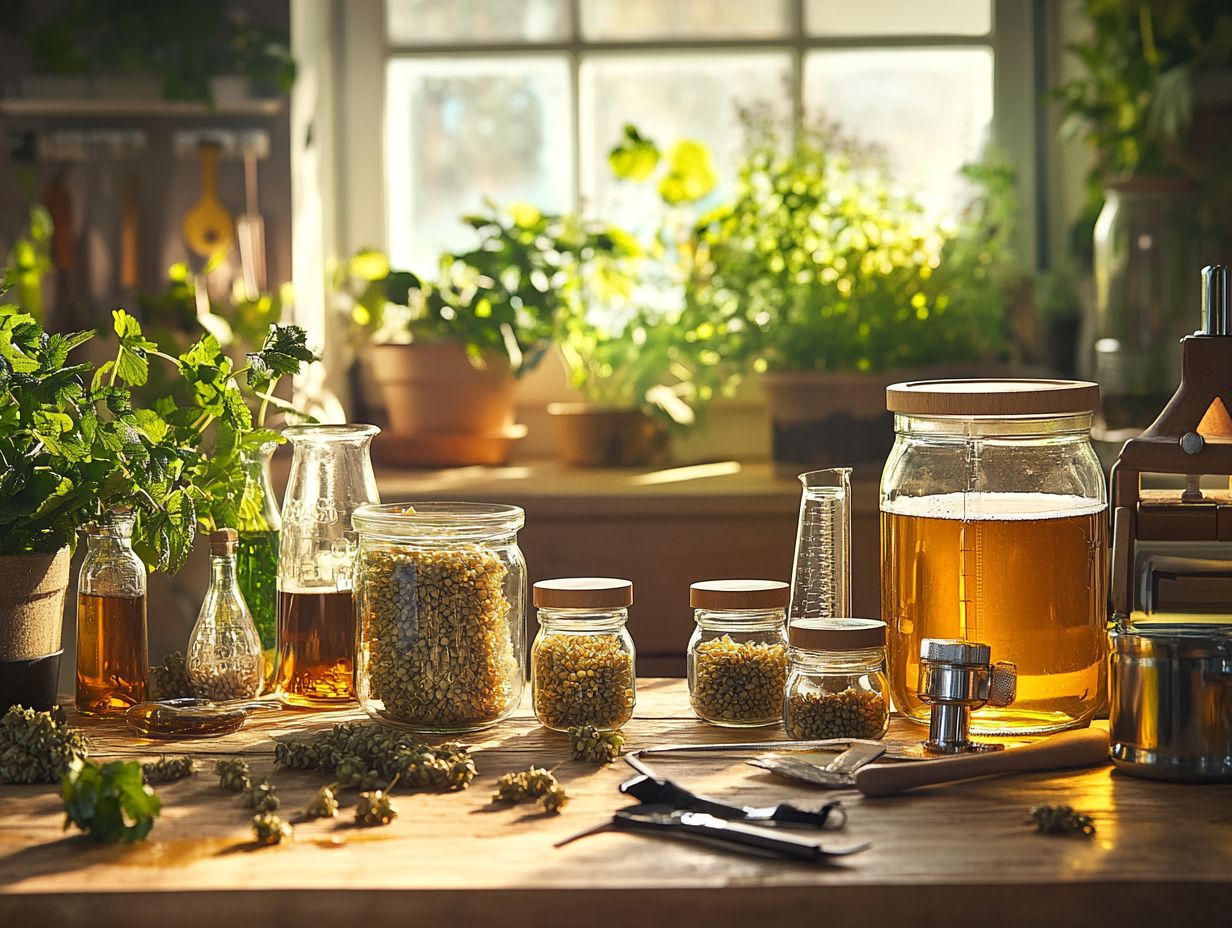
Brewing additives are essential for enhancing the flavor and aroma of your beer, enabling you to create unique and memorable brews.
These additives come in various forms, from fruits and herbs to unconventional ingredients like cacao nibs and spices. Each offers its distinct sensory experience. For example, when you add cacao nibs, they introduce rich chocolate notes that deepen the complexity of stouts and porters.
Honey can impart a natural sweetness and floral undertones, making it a fantastic choice for light ales and meads.
Spices like coriander or cinnamon elevate traditional recipes by adding warmth and depth, transforming an ordinary beer into something truly exceptional. By thoughtfully incorporating these elements into your brewing process, you showcase your creativity and craft beers that resonate with a broader audience, inviting exploration and enjoyment.
2. Improve Appearance
One of the standout advantages of using brewing additives is their remarkable ability to enhance the appearance of your beer, particularly when it comes to achieving that sought-after clarity. This clarity not only elevates the visual appeal but also significantly influences how your final product is perceived by consumers.
Ingredients like Irish Moss and gelatin serve as effective fining agents, binding to particulates and sediment that can muddle your brew. When you incorporate these additives, you’ll likely witness a notable transformation in the visual presentation of your beer, which contributes to a more enjoyable drinking experience.
Clear beer often conveys a sense of higher quality, leaving a favorable impression on both beer enthusiasts and casual drinkers, and ultimately reflecting your commitment to excellence as a brewer. Notable brewers like David Ackley emphasize the importance of clarity in the overall beer experience.
3. Extend Shelf Life
Using specific brewing additives can significantly extend the shelf life of your beer, ensuring it maintains its exquisite taste and quality for an extended period.
These additives, including ascorbic acid and select preservatives, are essential in preventing spoilage and oxidation, which are often the culprits behind off-flavors and a decline in overall quality. Ascorbic acid, commonly known as Vitamin C, serves as a potent antioxidant that neutralizes free radicals, reducing the chances of harmful reactions that could compromise your beer’s flavor.
Preservatives like potassium sorbate or sodium benzoate work to inhibit the growth of unwanted microbes, enhancing the stability of your brew. You would typically incorporate these additives during the fermentation process or just before packaging to maximize their effectiveness, ensuring that your beer not only retains its intended flavor profile but also remains fresh and enjoyable for your consumers well beyond its initial brewing date. Classic guides like “Brewing Lager Beer” can provide further insights into these processes.
What Are the Different Types of Brewing Additives?
There exists a diverse array of brewing additives designed to meet the specific needs of your brewing process. These include:
- yeast nutrients for robust fermentation,
- clarifying agents to enhance clarity,
- stabilizers to maintain consistency,
- flavorings to elevate the taste profile, and
- preservatives to extend shelf life.
Each additive plays a vital role in perfecting your brew, ensuring that every sip delivers a remarkable experience. For those interested in home beer making, understanding the role of each additive is essential to mastering the craft.
1. Yeast Nutrients
Yeast nutrients are essential brewing additives that elevate and support fermentation performance, ensuring that yeast remains active and healthy throughout the brewing process.
These nutrients are pivotal in optimizing fermentation rates, which can greatly impact the overall quality of the beer you craft. A well-balanced supply of nitrogen, along with essential vitamins and minerals like ascorbic acid, can spark vigorous fermentation, yielding a clean and flavorful profile that delights the palate.
Brewers often turn to common yeast nutrients like diammonium phosphate (DAP), gypsum, and yeast extract to enrich the yeast’s environment, enhancing its resilience and activity during the fermentation phases. Without an adequate supply of these nutrients, yeast may experience stress, leading to off-flavors and incomplete fermentation both of which detract from the beer’s character and overall drinkability.
2. Clarifying Agents
Clarifying agents are essential brewing additives that elevate your beer’s clarity, ensuring a visually stunning final product and improving beer clarity.
These agents are pivotal in the brewing process, clearing out unwanted particulates and haziness that can compromise the overall aesthetic of your brew. Take Irish Moss, for instance a beloved clarifying agent derived from seaweed. This additive is typically introduced during the boil phase, where it works its magic by clumping proteins together, enabling them to settle out during fermentation.
Then there s gelatin, a fining agent that operates differently. It binds with yeast and other suspended particles, effectively clearing your beer as it cools. Both of these clarifying agents do more than just enhance the visual appeal; they also contribute to a smoother mouthfeel. Techniques like dry hopping can also be used to enhance flavor and aroma while maintaining clarity.
For any brewer aspiring to achieve perfection in both clarity and taste, these additives are nothing short of essential.
3. Stabilizers
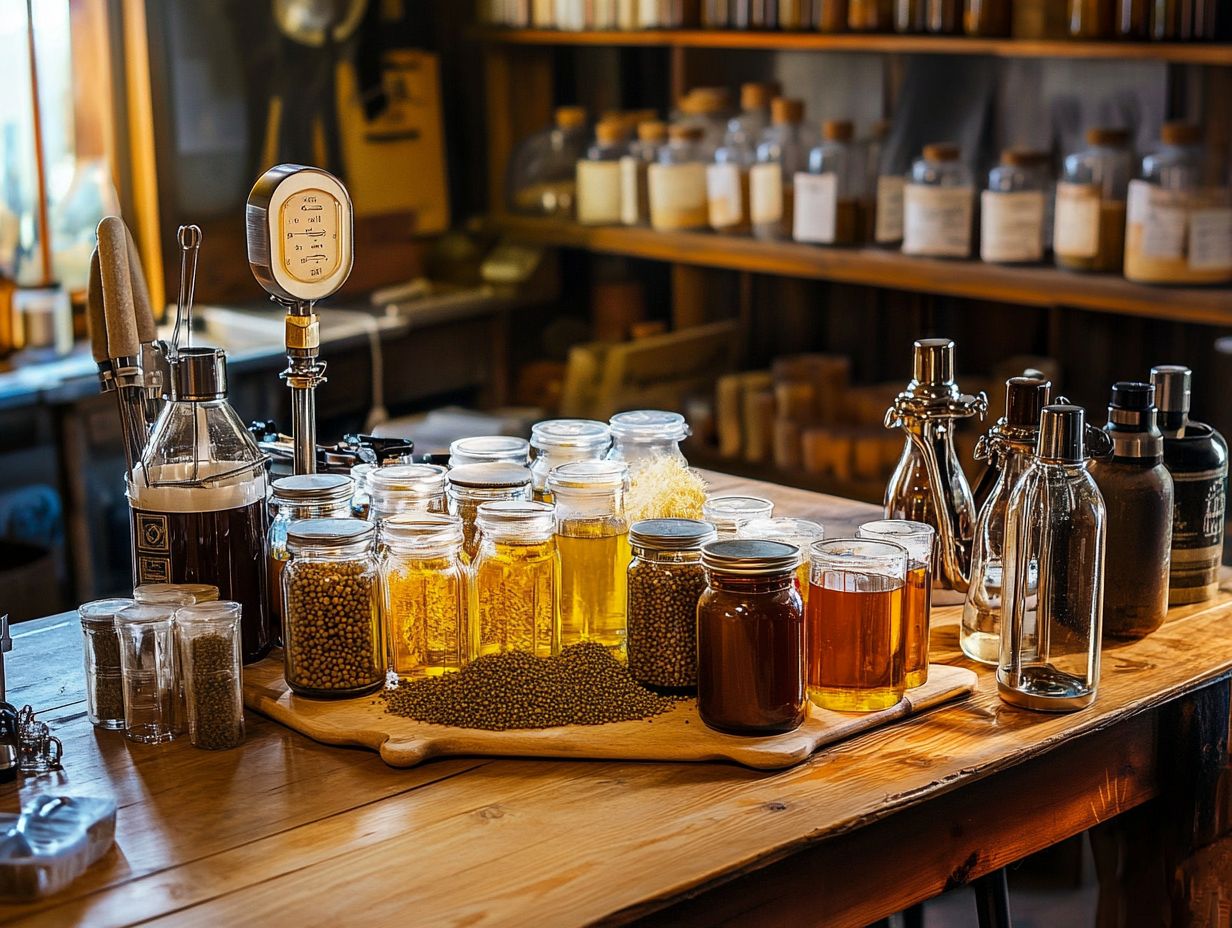
Stabilizers are essential brewing additives that play a vital role in maintaining the quality and stability of your beer throughout its shelf life. These agents work wonders by inhibiting microbial growth and slowing down oxidation two factors that can lead to spoilage and unwanted flavor changes.
For instance, potassium sorbate and sodium benzoate are commonly employed stabilizers that effectively prevent yeast activity even after fermentation. This ensures that your beer remains fresh and flavorful for longer.
Stabilizers like isinglass and gelatin also assist in the clarification process. They enhance the visual appeal of your final product while further preserving its taste.
By incorporating these stabilizing agents, you can deliver a consistently enjoyable experience to consumers, minimizing the risk of off-flavors and spoilage.
4. Flavorings
Flavorings are your secret weapons in the art of brewing, allowing you to infuse unique tastes and aromas into your beer and significantly enhance the overall drinking experience.
Get creative and experiment with cacao nibs to introduce a rich chocolate undertone, or sprinkle in spices like cinnamon and coriander to add warmth and complexity. Natural sweeteners, such as honey, can also be employed to bring depth and character to your creations. Other interesting additions like crystallized citrus or oak can further enhance your brew.
Exploring homebrewing techniques and trying out different beer recipes can help you discover new and exciting flavor combinations. By thoughtfully combining these elements, you can produce distinctive beers that truly stand out in a crowded market, making each sip an unforgettable experience.
5. Preservatives
Preservatives are essential brewing additives that play a crucial role in extending the shelf life of your beer, preventing spoilage, and maintaining its quality.
During the brewing process, you ll find various preservatives like sulfur dioxide and hops commonly used to ensure that your beers keep their intended flavors and aromas over time. Sulfur dioxide, renowned for its antioxidant properties, works diligently to prevent oxidation, which can introduce off-flavors and spoilage.
Meanwhile, hops not only add that distinct bitterness and aroma but also bring natural antimicrobial properties to the table, helping to ward off unwanted bacteria. Some brewers may take it a step further by employing filtration systems or pasteurization, enhancing the shelf stability of their creations.
This demonstrates how different preservatives and techniques are vital in crafting a high-quality product that you can savor long after it s been brewed.
How Are Brewing Additives Used in the Brewing Process?
Understanding how brewing additives are used is crucial for those following the Reinheitsgebot purity law, which traditionally allows only a few ingredients in beer. Modern interpretations and exceptions can include various additives to enhance the brewing process.
Brewing additives play a crucial role at multiple stages of the brewing process, from the mash to the boil, fermentation, and packaging. Each additive serves a distinct purpose, carefully made to elevate the overall quality of the beer you create.
1. During the Mash
Are you ready to unlock the full potential of your beer brewing? During the mash, using the correct water chemistry is crucial. Incorporating minerals like gypsum and calcium carbonate can optimize the mash pH and enhance enzyme activity.
Make sure to add brewing additives like yeast nutrients and enzymes to ensure effective starch conversion and promote healthy fermentation. These essential components play a pivotal role in optimizing your brewing process.
They enhance both the flavor profile and performance of your beer. For example, enzymes such as alpha-amylase and beta-amylase work together seamlessly to break down complex carbohydrates into fermentable sugars, significantly boosting your efficiency.
Incorporating yeast nutrients provides crucial elements like nitrogen, which is vital for maintaining robust yeast health and activity. This meticulous balance of brewing additives not only promotes a more consistent fermentation but also reduces off-flavors, ultimately leading to a cleaner, more enjoyable final product.
Proper water treatment using additives like calcium carbonate can also enhance the brewing environment.
2. During the Boil
Imagine the amazing flavors you can create with different hop varieties! Experts such as David Ackley and publications like Brewing Lager Beer offer valuable insights into how different additives affect the brewing process.
In the boil stage of brewing, you introduce additives like hops and flavoring agents to infuse your beer with bitterness, flavor, and aroma. These ingredients are not merely optional; they are essential in defining the overall character of your final product, striking an intricate balance between bitterness and sweetness.
You can also get adventurous by incorporating brewing additives such as spices, fruit purees, lactose, or even coffee during the boil, allowing you to put a creative spin on traditional recipes.
By meticulously selecting and timing these additions, you can achieve the desired levels of complexity, depth, and freshness, ultimately crafting a unique sensory experience for yourself and those who savor your creation.
3. During Fermentation
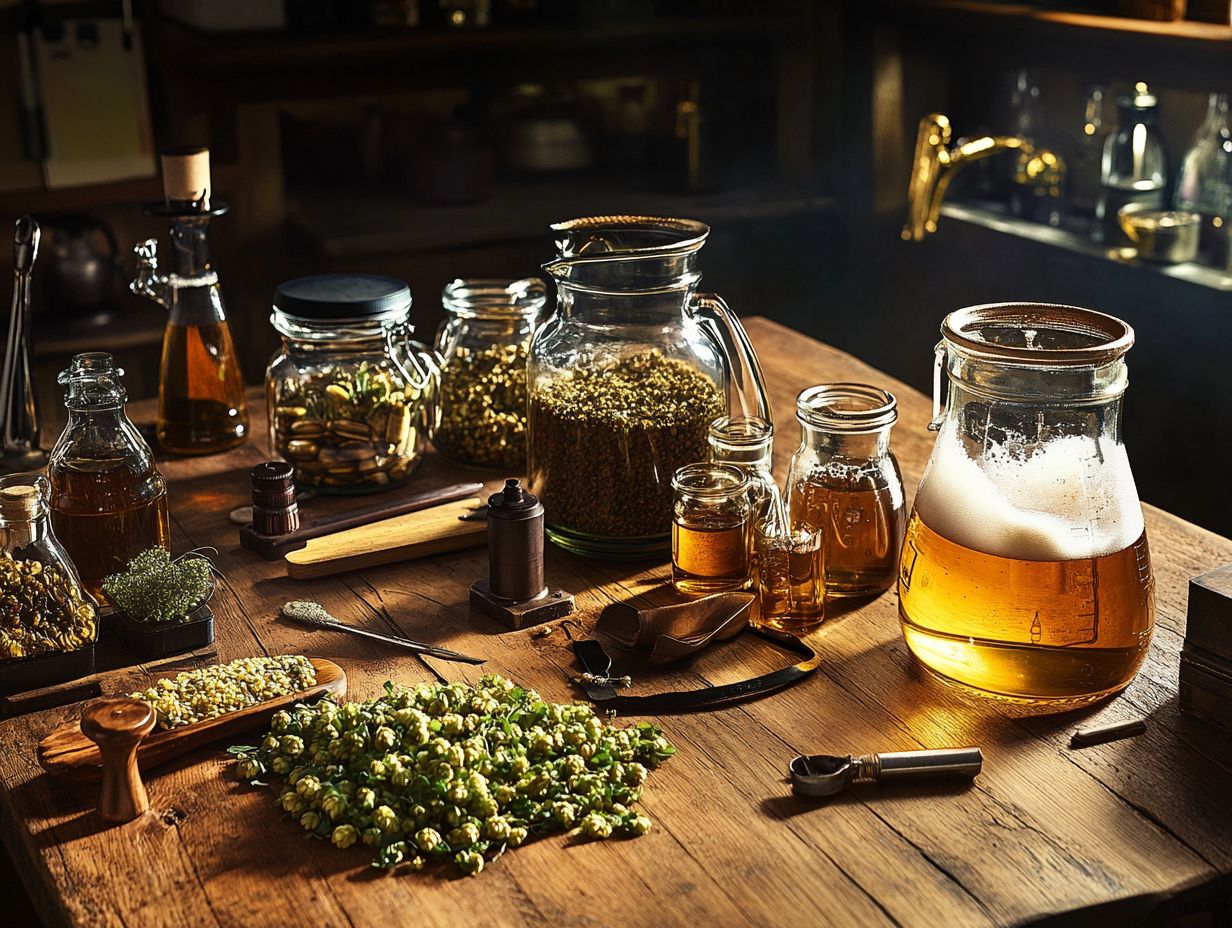
Publications from the Institute of Brewing and Distilling offer guidelines on how to optimize fermentation performance using various additives.
During fermentation, leveraging brewing additives like yeast nutrients is essential for fostering healthy yeast activity and maintaining optimal fermentation temperature.
These additives are not just optional extras; they play a crucial role in streamlining the fermentation process. By supplying vital components such as nitrogen, vitamins, magnesium sulfate, and minerals, they create an environment where yeast can flourish and efficiently complete the fermentation cycle.
By enhancing yeast metabolism, these substances can elevate the overall flavor profile and stability of your final product. Thoughtful use of brewing additives helps alleviate fermentation challenges stemming from temperature fluctuations or nutrient shortages, enabling the yeast to operate at its peak performance.
This meticulous approach results in a brew that is not only consistent but also of exceptional quality, beautifully reflecting your intentions and artistry as a brewer.
4. During Packaging
During the final stage of brewing, additives are crucial. They maintain flavor stability and ensure proper carbonation levels. Learning from resources like Brewers Publications or experts from the Institute of Brewing and Distilling can help you understand the best practices for using these additives.
These additives may include preservatives like potassium sorbate and sodium benzoate. They are essential in preserving the quality of the beer long after it has left the brewery. By preventing the growth of harmful bacteria, these substances help prevent spoilage, effectively extending the product’s shelf life.
Clarifying agents may also be utilized to enhance visual appeal, ensuring that your beer maintains a consistent appearance. Ultimately, the thoughtful selection and application of these brewing additives not only keep the flavors intact but also uphold the beer’s overall integrity. This allows you to savor the intended taste right up until the last sip.
Frequently Asked Questions
What are brewing additives?
Brewing additives are substances added to the brewing process to enhance the flavor, aroma, color, or stability of beer. They can be natural or synthetic and are used in varying amounts depending on the desired outcome. Common examples include ascorbic acid, lactose, yeast nutrient, and various spices.
Why are brewing additives important?
Brewing additives play a crucial role in the brewing process as they can greatly impact the final product. They enhance the overall taste and appearance of beer, as well as improve its shelf life and stability. Whether you’re an experienced brewer or just starting with home beer making, understanding these additives is essential for creating high-quality brews.
What are some common types of brewing additives?
Brewing additives have been a part of the brewing process for centuries, although the Reinheitsgebot initially limited their use. David Ackley’s writings and resources from Brewers Publications and the Institute of Brewing and Distilling offer extensive insights into using these additives in modern brewing.
Some common types of brewing additives include hops, spices, fruits, sugars, and fining agents. Additives like Irish Moss, gelatin, and isinglass are used for beer clarity. Others, such as cacao nibs, lactose, oak, crystallized citrus, and honey, add unique flavors. Each type serves a specific purpose and can be used alone or in combination with others to achieve desired results.
Do brewing additives affect the alcohol content of beer?
Yes, brewing additives can affect the alcohol content of beer. Some additives, such as sugars and lactose, can increase the alcohol content. Others, like fining agents such as gelatin and isinglass, do not impact it. Using certain additives can also improve fermentation performance.
Are brewing additives safe to consume?
Yes, brewing additives are generally safe to consume. However, it is important to use them in recommended amounts and to thoroughly research any potential allergies or sensitivities before adding them to your brew. Home beer making safety often involves understanding the impact of additives on the brewing process, such as water treatment with calcium carbonate, gypsum, and magnesium sulfate.
Should I use brewing additives in every batch of beer?
Feel free to experiment! You don t have to use brewing additives in every batch. They are often used to enhance or experiment with flavors, so it ultimately depends on your personal preference and the style of beer you are brewing. Homebrewing techniques such as dry hopping and the use of yeast nutrients or ascorbic acid can be explored through various beer recipes.

